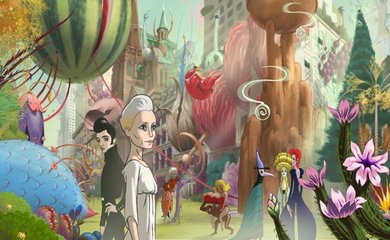Masquerading as a “Vice” magazine documentary, Ti West’s latest film, “The Sacrament” makes chilling use of immersionist journalism to reimagine the “Jonestown Massacre” as a contemporary event. “Vice” reporter Sam and his cameraman Jake tag along with fashion-photographer Patrick after he is suddenly contacted by his troubled sister Caroline from a Christian commune called Eden Parish. Sam wants to film an expose of this hidden community whilst experiencing the situation for himself first hand. The set-up is laced with 80s synths that threaten to take your head off before the haunting sounds of “Heartbeats” by “The Knife” gradually transport the threesome further and further away from their comfort zone.
Still, Sam and Jake are far from green, having dispatched from various warzones across the globe. They rationally interpret their surroundings, guarding against the predisposed cynicism of alternative cultures so readily available to other social media newshounds. When they arrive at Eden Parish and meet Caroline their fair mindedness actually blinkers their gut instinct that something is amiss. Sam’s eventual interview with the self-styled “Father” in front of a wooden cross is a master class of manipulation. Like an open-air episode of “Oprah” the savvier saviour ambushes the media-smart Sam with questions about Sam’s unborn child. “Father’s” power is insidious; guiding his flock to “The Sacrament’s” gut-wrenching climax, confirming that West’s horror film should be regarded as the most intelligent entry into that genre over the last decade.
Freda Kelly has a secret. A secret harboured for over 40 years and finally revealed in Ryan White’s charming documentary, “Good Ol’ Freda.” Back in early 1960s Liverpool, Freda was as a teenage typist who spent every lunch hour at “The Cavern Club” watching “The Beatles.” She started running their fan club from her father’s house before being employed by Brian Epstein as the band’s secretary, a role she kept until their eventual split in 1970. The real fascination with White’s film is Freda’s relationship with each band member’s family, especially with Ringo Starr’s parents. Freda’s own mother died when she was just 18 months old and Starr’s mum; Elsie touchingly became the closest thing she ever had to a mum. In this age of social media, Freda’s sense of loyalty to the most famous band in the world, deeply rooted in Liverpool’s working class, is admirable and refreshing.
Savage internecine rivalry dominates Park Hoon-jung’s Korean gangster epic, “New World.” When the leader of the Goldmoon crime syndicate dies in a suspicious car accident, the pseudo corporate entity threatens to dissolve into the various clans that make up the sum of its parts. The front-runners are the brazen Tony Montana wannabe Jung who runs the money laundering operation and the ruthlessly efficient Lee who keeps the warring factions in line. Jung’s right-hand man, Ja-sung watches from the sidelines as the two rivals try to out manoeuvre one another with increasing Machiavellian brutality. What both heirs don’t realise is that the Ja-sung is actually an undercover cop handled by the amoral Chief Kang, the man who is really pulling the strings behind Goldmoon’s bloody succession.
“New World” wears its influences firmly on its blood soaked sleeves. It is unashamedly generic, heavily referencing, “The Godfather,” “Infernal Affairs,” and Takeshi Kitano’s, “Outrage” and entirely all the better for doing so. Hundreds of sharply suited corporate gangsters flank their masters, scowling in board meetings or leering at funerals. Gunplay is kept to a minimum in favour of baseball bats and stinging blades, clubs, fists and open palms. A titanic last stand by one of the central characters involving a battle between dozens of clan members in an underground car park is fraught with the same visceral lethality experienced in “The Wild Bunch” and “Scarface.” Park Hoon-jung’s film threatens to meander but as Ja-sung’s predicament becomes ever more treacherous, “New World” forces you at gunpoint to watch its epic finale.
Far from generic is Ari Folman’s, “The Congress” a loose adaptation of Stanislaw Lem’s novel “The Futurological Congress.” Robin Wright plays herself in the near future, an actress accused by her agent of making, “Lousy choices” in men and movies alike. One of these “Lousy choices” is her son Aaron who has a degenerative disease that consumes her love, time and money. Trying to resurrect an actress’ career on the wrong side of 40 is a classic Hollywood story; think, “Sunset Boulevard, “You were the future Robin. You were the promise, the answer,” laments the head of “Miramount” studios. Still they offer her a lifeline, a 20-year contract with one small catch; she will be scanned and used by the studio as a character, not an actress. Robin Wright the person must never act again.
Flash-forward 20 years and Wright is speeding in her 2013 Porsche towards the animated world of “Abrahama” to renew her contract. Live-action liquefies into psychedelic cartoons as Folman transports us into a Ralph Bakshi paradise where the only other remaining digital A-list star is Tom Cruise, complete in his “Top Gun” flight suit. “The Congress” becomes Robin’s existential quest for identity amongst a backdrop of the sublime and the ridiculous. “Miramount” have created technology that allows the digital stars to be consumed like a substance in food or drink, the ultimate Faustian product. Newly arrived in “Abrahama” the animated Robin watches her scanned self in a movie she never acted in. Combine that conundrum with the thought that Stanley Kubrick might be God residing in an airship, then “The Congress” is the work of a thought provoking mad genius.



